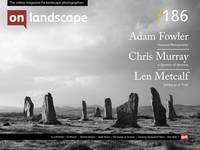Making the case for a “gradless” capture process

Alex Nail
Alex Nail is a professional mountain photographer who regularly backpacks in remote landscapes. He leads adventurous workshops in the UK and abroad and works for UK tourism and conservation organisations. He is a strong advocate for maintaining the realism of landscape photography.
I’ve been hearing a LOT about filters lately. It seems half the photographers on my social feeds are brand ambassadors for one filter company or another and boy do they make sure I know! Recently our own Tim Parkin has unwittingly made On Landscape part of the hype train. Kase Filters are the MOST COLOUR NEUTRAL FILTERS! Shout it from the rooftops! Or don’t use filters at all.
For those of you, like me, who are ‘in deep’ in the landscape photography world it sometimes feels like you are living in the Twilight Zone. Gear discussions about almost totally irrelevant specs “an extra 0.5 stops of dynamic range” soon turn heated and we forget about the photography itself. But nothing has confused me more than the modern obsession with Graduated Neutral Density Filters, or grads.
An admission
Before I really lay into the use of grad filters I thought I would undermine myself by explaining my bias. When I started photography 12 years ago I did washing up through my university holidays to finance my first SLR. All my gear was second hand, and there was no way I was going to buy a filter set when I could exposure blend for free on my pirated copy of Photoshop CS2. Back then blending exposures was time consuming and complex. I made many mistakes along the way, but I quickly reached a level that matched the effects of grads and later exceeded them from a technical perspective. When I became a backpacker the reasons for the digital process multiplied - I didn’t fancy carrying that extra half kilo or looking after a load of delicate bit of resin in challenging environments. That is to say, I have never used filters and, barring a foray into film, I never will.
Setting aside my own experiences there are many reasons to make the case for a “gradless” capture process.
1. Getting It Right in Camera
If you ask photographers why they use grads you’ll get a mix of answers, but chief among the explanations is ‘Getting it Right in Camera’.
Selecting and placing grads is almost an art in itself. The photographer can look at a scene and judge the luminance balance between the sky and ground (commonly) as well as how quickly that light transition occurs and then select a grad that roughly does the right thing. The grad must then be positioned correctly in accordance with the scene (usually now using live view because it is the most precise method). Ideally, the lens should be stopped down to the selected aperture in order to see most precisely what the final effect will be. Select the grad incorrectly or position it poorly and you’ve just done the opposite of what you intended. You are “Getting it Wrong in Camera” (do you see what I did there?). “Getting it Right in Camera” is, of course, shooting an exposure bracket.

